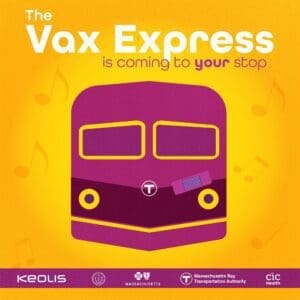 States continue to push for residents to sign up for the Covid-19 vaccination. In Massachusetts, the state is rolling out the Vax Express this week, which is a partnership between the MBTA and private health startup CIC Health. The program will use an MBTA commuter rail train to create a rolling vaccination site that will make stops at stations in disproportionately impacted communities with low vaccination rates. The public can walk up without an appointment or book an appointment in advance. The Vax Express will offer the two-dose Pfizer vaccine for ages 12 and up and the single-dose Johnson & Johnson vaccine for ages 18 and up. Starting this past Wednesday and rolling through Sunday, the Vax Express will visit Boston, Mattapan, Worcester, Lowell, Lawrence, and Fitchburg. A second round of vaccinations aboard the Vax Express will take place July 7 to 11 at the same locations. This seems like a smart use of the trains which have seen significantly lower ridership over the last year. And now on to this week’s logistics news.
States continue to push for residents to sign up for the Covid-19 vaccination. In Massachusetts, the state is rolling out the Vax Express this week, which is a partnership between the MBTA and private health startup CIC Health. The program will use an MBTA commuter rail train to create a rolling vaccination site that will make stops at stations in disproportionately impacted communities with low vaccination rates. The public can walk up without an appointment or book an appointment in advance. The Vax Express will offer the two-dose Pfizer vaccine for ages 12 and up and the single-dose Johnson & Johnson vaccine for ages 18 and up. Starting this past Wednesday and rolling through Sunday, the Vax Express will visit Boston, Mattapan, Worcester, Lowell, Lawrence, and Fitchburg. A second round of vaccinations aboard the Vax Express will take place July 7 to 11 at the same locations. This seems like a smart use of the trains which have seen significantly lower ridership over the last year. And now on to this week’s logistics news.
- Starbucks facing supply chain shortages
- Amazon hopes more robots will improve worker safety
- Home Depot contracted its own container ship
- Autonomous delivery startup Nuro partners with FedEx
- Waymo and JB Hunt partner to bring autonomous trucks to Texas
- Goodyear adds AI to delivery vehicle tires
- US-EU agree ceasefire in long-running trade war
- Lowes Foods pilots grocery pickup lockers at the workplace
 There have been product shortages for a number of restaurants and retailers recently, as supply chains have felt the effects of labor and supply shortages. Starbucks is facing shortages across a number of areas. The coffeehouse chain is having issues with such items as cups, coffee syrups, cake pops, cup stoppers, and mocha flavoring. Additionally, Starbucks has removed oat milk and beverages made with oat milk from its mobile app until the inventory can be replenished. The company will focus on its higher selling items and putting a pause on lower selling items to try to correct the supply chain issues it is facing.
There have been product shortages for a number of restaurants and retailers recently, as supply chains have felt the effects of labor and supply shortages. Starbucks is facing shortages across a number of areas. The coffeehouse chain is having issues with such items as cups, coffee syrups, cake pops, cup stoppers, and mocha flavoring. Additionally, Starbucks has removed oat milk and beverages made with oat milk from its mobile app until the inventory can be replenished. The company will focus on its higher selling items and putting a pause on lower selling items to try to correct the supply chain issues it is facing.
![]() Amazon is continuing to invest in robots for the warehouse, with the hope that more robots will help to improve employee safety. Specifically, the company is testing four new robots nicknamed Bert, Ernie, Kermit, and Scooter to pick up boxes and move them throughout the facilities to “reduce the need for employees to reach up or bend down when retrieving items.” Bert can freely move around a warehouse carrying carts and goods. Scooter carries carts like a train, while Kermit is more truck-like and hauls empty tote boxes using magnetic tape and tags to shape its path. Ernie uses its arm to grab items off robotic shelves so that workers don’t have to stretch upwards or bend down. Amazon is also tracking warehouse tasks using motion capture software in an effort to redesign equipment and workflows.
Amazon is continuing to invest in robots for the warehouse, with the hope that more robots will help to improve employee safety. Specifically, the company is testing four new robots nicknamed Bert, Ernie, Kermit, and Scooter to pick up boxes and move them throughout the facilities to “reduce the need for employees to reach up or bend down when retrieving items.” Bert can freely move around a warehouse carrying carts and goods. Scooter carries carts like a train, while Kermit is more truck-like and hauls empty tote boxes using magnetic tape and tags to shape its path. Ernie uses its arm to grab items off robotic shelves so that workers don’t have to stretch upwards or bend down. Amazon is also tracking warehouse tasks using motion capture software in an effort to redesign equipment and workflows.
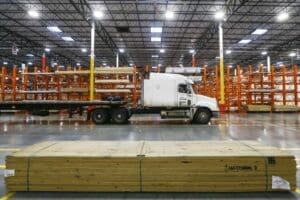 Port congestion has made the headlines as delays in unloading goods have strained global supply chains. As one of the largest importers of goods in the US, Home Depot is taking matters into its own hands. The company has contracted a ship that will begin running next month. According to Home Depot’s President and Chief Operating Officer Ted Decker, “we have a ship that’s solely going to be ours and it’s just going to go back and forth with 100 percent dedicated to Home Depot.” This is not the only measure the company has taken in response to port congestion and supply chain delays. Over the last few months, it has also bought merchandise on the spot market and flown in power tools, faucets, electrical components, fasteners and other smaller, higher value items by air freight.
Port congestion has made the headlines as delays in unloading goods have strained global supply chains. As one of the largest importers of goods in the US, Home Depot is taking matters into its own hands. The company has contracted a ship that will begin running next month. According to Home Depot’s President and Chief Operating Officer Ted Decker, “we have a ship that’s solely going to be ours and it’s just going to go back and forth with 100 percent dedicated to Home Depot.” This is not the only measure the company has taken in response to port congestion and supply chain delays. Over the last few months, it has also bought merchandise on the spot market and flown in power tools, faucets, electrical components, fasteners and other smaller, higher value items by air freight.
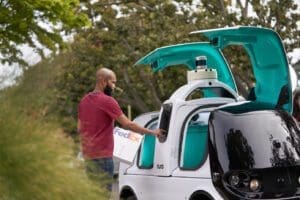 Autonomous delivery start-up Nuro has been making a name for itself over the last few years, partnering with the likes of CVS, Domino’s, and Kroger to make autonomous home deliveries. Now, the company is entering the parcel logistics space with a new partnership with FedEx. The multiyear, multiphase strategic partnership aims to test and ultimately deploy Nuro’s next-generation autonomous delivery vehicle within FedEx operations. The pilot program has already started in Houston and will use Nuro’s bots to travel on streets delivering packages. FedEx said it has made a long-term commitment to use Nuro’s autonomous bots for last-mile delivery at large scale.
Autonomous delivery start-up Nuro has been making a name for itself over the last few years, partnering with the likes of CVS, Domino’s, and Kroger to make autonomous home deliveries. Now, the company is entering the parcel logistics space with a new partnership with FedEx. The multiyear, multiphase strategic partnership aims to test and ultimately deploy Nuro’s next-generation autonomous delivery vehicle within FedEx operations. The pilot program has already started in Houston and will use Nuro’s bots to travel on streets delivering packages. FedEx said it has made a long-term commitment to use Nuro’s autonomous bots for last-mile delivery at large scale.
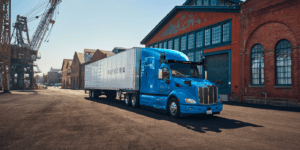 In other autonomous vehicle news, Waymo is partnering with JB Hunt on a new pilot program in Texas. The two companies are calling it a “test run” that will take place in one of the country’s busiest trade corridors. Waymo will transport goods along Interstate 45 between Houston and Fort Worth, Texas. The trucks will be powered by the Waymo Driver autonomous platform, though a Waymo “autonomous specialist,” a commercially licensed truck driver and a software technician will be riding in each truck to monitor the operations. According to Waymo, this is a “limited duration pilot with the goal of jointly developing a long-term plan for how our companies can work together.”
In other autonomous vehicle news, Waymo is partnering with JB Hunt on a new pilot program in Texas. The two companies are calling it a “test run” that will take place in one of the country’s busiest trade corridors. Waymo will transport goods along Interstate 45 between Houston and Fort Worth, Texas. The trucks will be powered by the Waymo Driver autonomous platform, though a Waymo “autonomous specialist,” a commercially licensed truck driver and a software technician will be riding in each truck to monitor the operations. According to Waymo, this is a “limited duration pilot with the goal of jointly developing a long-term plan for how our companies can work together.”
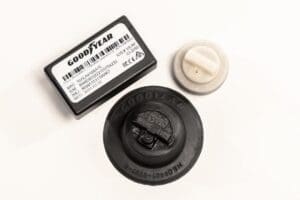 Goodyear is adding a new tool to delivery vehicles for fixing a flat tire: artificial intelligence. The company is rolling out new intelligent tire features that use sensors and artificial intelligence for vehicles delivering packages, with an emphasis on those that focus on the last mile. Goodyear’s new technology is called SightLine and includes a sensor and proprietary machine-learning algorithms that can predict flat tires or other issues days ahead of time, by measuring tire wear, pressure, road-surface conditions and many other factors. In a pilot test with about 1,000 vehicles operated by 20 customers, SightLine was able to detect 90 percent of their tire-related issues ahead of time.
Goodyear is adding a new tool to delivery vehicles for fixing a flat tire: artificial intelligence. The company is rolling out new intelligent tire features that use sensors and artificial intelligence for vehicles delivering packages, with an emphasis on those that focus on the last mile. Goodyear’s new technology is called SightLine and includes a sensor and proprietary machine-learning algorithms that can predict flat tires or other issues days ahead of time, by measuring tire wear, pressure, road-surface conditions and many other factors. In a pilot test with about 1,000 vehicles operated by 20 customers, SightLine was able to detect 90 percent of their tire-related issues ahead of time.
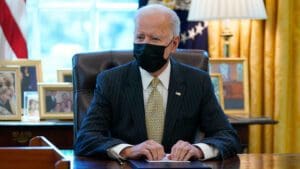 A five-year ceasefire in the long-running US-EU trade war over subsidies to aircraft makers has been agreed during Joe Biden’s visit to Brussels, as the White House sought to focus attention on the greater threat said to be posed by China. Billions of euros and dollars-worth of tariffs imposed on the US manufacturer Boeing and its European rival Airbus will be suspended after both sides committed to work on removing unfair subsidies. The announcement came at the end of a summit in Brussels attended by Biden, Von der Leyen, and the European Council president, Charles Michel, the first such meeting in seven years. The new agreement will officially go into effect on July 11.
A five-year ceasefire in the long-running US-EU trade war over subsidies to aircraft makers has been agreed during Joe Biden’s visit to Brussels, as the White House sought to focus attention on the greater threat said to be posed by China. Billions of euros and dollars-worth of tariffs imposed on the US manufacturer Boeing and its European rival Airbus will be suspended after both sides committed to work on removing unfair subsidies. The announcement came at the end of a summit in Brussels attended by Biden, Von der Leyen, and the European Council president, Charles Michel, the first such meeting in seven years. The new agreement will officially go into effect on July 11.
As e-commerce grocery orders continue to surge, many retailers are looking at alternative methods for pick-up operations. Lowes Foods has partnered with Bell and Howell’s QuickCollect Solutions unit to fulfill online grocery orders delivered to temperature-controlled pickup lockers at workplaces. Winston-Salem, NC-based Lowes and QuickCollect have deployed the first set of grocery pickup lockers outside Bell and Howell’s headquarters in Durham, NC. Groceries are delivered to the lockers via the Lowes Foods To Go service. Plans call for the companies to roll out QuickCollect GL pickup lockers to more office and corporate campus locations, enabling employees to order groceries from Lowes online and have them delivered to their worksite for pickup.
That’s all for this week. Enjoy the weekend and the song of the week, The Doobie Brothers Long Train Running.
















